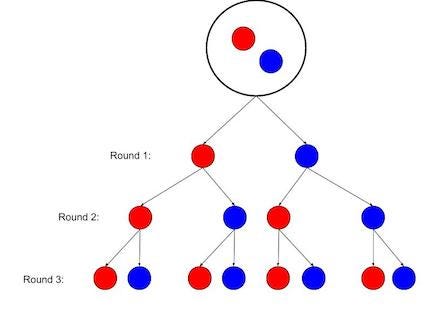Why do the two solutions differ.
Is picking two marbles permutation.
A draw the tree diagram for the experiment.
If we want to figure out how many combinations we have we just create all the permutations and divide by all the redundancies.
Suppose an opaque jar contains 4 red marbles and 10 green marbles the following exercise refers to the experiment of picking two marbles from the jar without replacing the first o log on.
Choosing a first marble then a second is the same as first choosing two marbles then picking which goes first.
So if we have 3 tin cans to give away there are 3.
And sometimes this is referred to as the sample space the set of all the possible outcomes.
It is crucial that you are choosing items without replacement for the two methods to be equivalent.
Assuming each color of marble is identical and it doesn t matter which specific marble of each color is chosen calculate the number of possible permutations in which you can remove the 10 marbles.
In this case you know whether both are red after the first step so the second step is not necessary and you can work with combinations.
So this is all the possible outcomes.
B find probabilities for p bb p br p rb p ww p at least one red p exactly one red 3.
There s two green marbles in the bag.
If we randomly select two marbles from the bag what is the probability that the selected marbles are of different colors in other words one white and one red.
Selecting k objects from n objects is given by.
Two marbles are drawn without replacement from a jar containing 4 black and 6 white marbles.
Endgroup jessica oct 6 13 at 3 36.
Two marbles are drawn without replacement.
Fancy word for just a simple idea that the sample.
Or 6 variations for every choice we pick.
There s one blue marble.
In our case we get 336 permutations from above and we divide by the 6 redundancies for each permutation and get 336 6 56.
Endgroup sudarsan oct 6 13 at 3 24 begingroup assuming the marbles are identical and order doesn t matter.
Algebra permutations solution.
You remove them from the bag one of the time without replacement.
There are 4 red marbles 3 yellow 2 green and 1 blue marble.
A jar contains 4 black marbles and 3 red marbles.
1 after marble no 2 is different from vice versa.
For permutations without repetition we need to reduce the number of objects that we can choose from the set each time.
And then there s one blue marble in the bag.

